The Bamboo Apparel Market is estimated to be valued at USD 2.7 billion in 2025 and is projected to reach USD 4.8 billion by 2035, registering a compound annual growth rate (CAGR) of 6.0% over the forecast period.
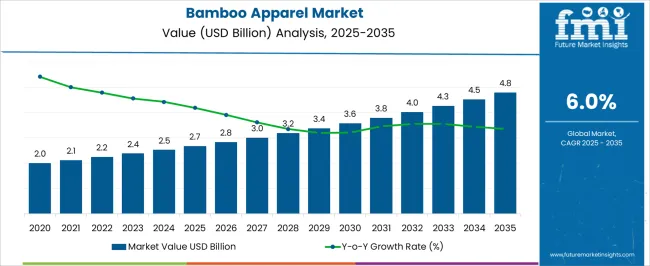
| Metric | Value |
|---|---|
| Bamboo Apparel Market Estimated Value in (2025 E) | USD 2.7 billion |
| Bamboo Apparel Market Forecast Value in (2035 F) | USD 4.8 billion |
| Forecast CAGR (2025 to 2035) | 6.0% |
The bamboo apparel market is gaining strong traction as consumer preferences shift toward sustainable fashion choices and environmentally responsible textiles. The inherent qualities of bamboo fabric such as breathability, antibacterial properties, moisture wicking, and biodegradability are increasing its adoption across both activewear and casual wear categories.
Brands are investing in closed loop manufacturing processes and OEKO TEX certified bamboo sources to align with regulatory and ethical standards. Growing awareness around fast fashion’s environmental impact is prompting fashion retailers and eco conscious consumers to embrace bamboo based alternatives.
Additionally, advancements in bamboo fiber processing techniques have improved fabric softness, durability, and adaptability across a range of apparel formats. With the fashion industry under scrutiny for carbon emissions and textile waste, bamboo apparel offers a compelling solution that combines functionality, comfort, and low ecological footprint, ensuring long term growth prospects.
The market is segmented by Type, Fabric Type, Consumer Orientation, and Distribution Channel and region. By Type, the market is divided into T-shirts, Innerwear’s, Bathrobes, Towels, Socks, and Others. In terms of Fabric Type, the market is classified into Pure and Blends. Based on Consumer Orientation, the market is segmented into Men, Women, and Kids. By Distribution Channel, the market is divided into Hypermarket/Supermarket, Wholesale Dealers, Specialty Stores, Independent Stores, Online Stores, and Others. Regionally, the market is classified into North America, Latin America, Western Europe, Eastern Europe, Balkan & Baltic Countries, Russia & Belarus, Central Asia, East Asia, South Asia & Pacific, and the Middle East & Africa.
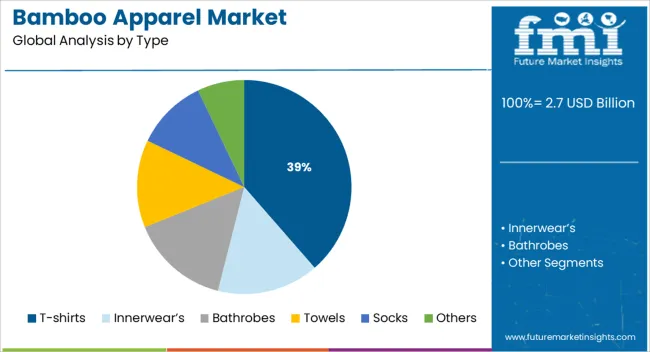
The t shirts segment is expected to represent 38.60% of total revenue by 2025 within the type category, making it the most prominent apparel segment. This growth is being supported by widespread demand for everyday essentials made from sustainable materials and the rise of eco friendly basics in both online and offline retail.
T shirts serve as a highly consumed wardrobe staple across demographics, making them ideal for scaling sustainable fabric use. Their cost effective production, mass appeal, and high volume movement in the apparel supply chain have contributed to their leadership position.
The ease of customization for branding and printing also makes bamboo t shirts popular for environmentally conscious corporate and promotional use, reinforcing their market strength.
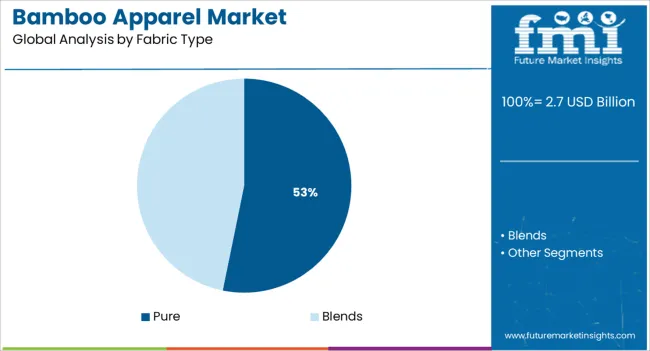
The pure bamboo fabric segment is projected to account for 53.20% of total market revenue by 2025 under the fabric type category, reflecting its dominance in the market. This preference is driven by increasing consumer demand for toxin free, chemical free, and hypoallergenic clothing.
Pure bamboo fabric offers superior softness, natural thermal regulation, and biodegradability without synthetic blending, aligning with clean label expectations in the fashion sector. The appeal of fully organic textiles and increasing scrutiny over fabric composition are contributing to the growth of this segment.
As transparency in garment sourcing becomes more important to buyers, brands are adopting pure bamboo fabrics to build credibility and align with global sustainability certifications, cementing this segment’s lead.
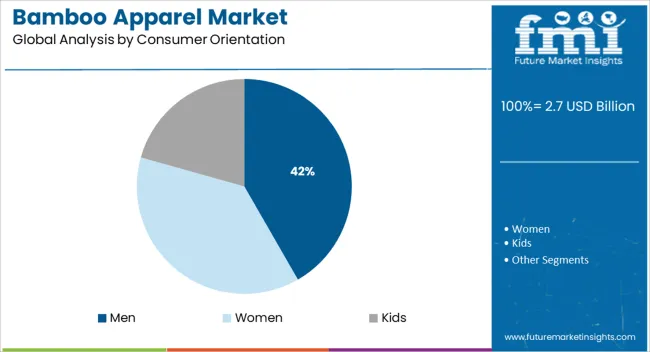
The men segment is forecasted to contribute 41.70% of total revenue by 2025 within the consumer orientation category, making it the dominant segment. This growth is supported by rising demand for minimalist, breathable, and functional clothing options in menswear that align with sustainability values.
Bamboo apparel’s moisture wicking and odor resistant properties are particularly favored in men’s casual, loungewear, and athletic apparel. Furthermore, marketing campaigns targeting conscious male consumers and rising interest in eco friendly basics are boosting adoption.
With greater awareness and accessibility to sustainable fashion options for men, this segment continues to lead, driven by comfort focused design and increased alignment with environmental concerns.
As per Future Market Insights (FMI), the market is expected to witness robust growth owing to the growing sustainability concerns and growing demand for woven bamboo apparel across the globe. As bamboo is 100% natural, soft like silk, and completely biodegradable.
The bamboo apparel is manufactured from extremely soft bamboo pulp. Bamboo's hollow fibers give it exceptional breathing properties, which makes it a fantastic fabric for clothes. The bamboo fiber has more micro gaps and micropores than any other material, which provides for better moisture absorption and ventilation. Because bamboo contains bamboo Kun, an antimicrobial bio-agent, which also gives it natural anti-allergic qualities, bamboo fabrics also have a distinctive antibacterial quality.
Bamboo has a high level of breathability, in contrast to many other materials. The natural bamboo plant maintains its fabric form and, like its other attributes, keeps itself cool in the heat. Micro-gaps are spread across the bamboo fiber’s cross-section, improving the fabric's capacity for moisture absorption and breathability.
The high expenses connected with the production of eco-fibers like bamboo fiber as well as their processing and manufacturing constitute a significant constraint for this sector. Over the course of the forecast period, the market is anticipated to be driven by rising infrastructure development investments, expanding use of sustainable building and construction materials, and growing consumer awareness of the uses and advantages of bamboo. Bamboo is a renewable resource that may grow in a variety of climates, though a tropical climate is preferred.
Sustainable Fashion Trend to Push Bamboo Apparel Sales among Gen-Zs
Bamboo has become a favorite material among sustainable fashion brands since it requires less water, labor, and time to grow than other common plants that are used as fabrics. Hence, end users are focusing on sustainability as the numerous effects of climate change become more apparent. As a result, the market is gaining significant attraction in the current scenario.
Consumers using a particular amount of a product without having a substantial negative impact on the likelihood of its source's regeneration is referred to as sustainability. When it comes to environmentally friendly and sustainable products, bamboo has a plethora of advantages. It is becoming a more viable option than other materials for making durable and lightweight products, which is highly gaining prominence in the global market.
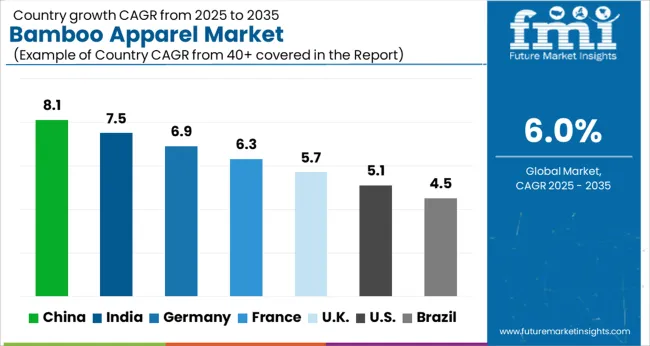
Increasing Product Launches and Celebrity Endorsements to Facilitate Bamboo Apparel Sales in India
One of the fastest-growing, most renewable, and biodegradable materials with significant environmental advantages is bamboo. As per FMI, the market in India is expected to grow at a CAGR of close to 10.4% during the forecast period.
Numerous product launches in India on the back of increasing demand for sustainable products are helping the brands to prosper. Further, a high number of celebrity endorsements by the players is attracting the young generation towards such product adoption.
For instance, Ranveer Singh, a Bollywood celebrity, endorsed Siya ram's campaign to promote the novel bamboo fabric. To bring the best of the world to Indian consumers, a leading apparel brand, Siyaram continuously develops goods and collaborates with some of the most talented craftspeople in the world.
The rigorous strategies by organizations in China attract more consumers
China is expected to be the most prominent market in the East Asia region, with the country exhibiting a value share of around 56% in the East Asia market.
The Shanghai International Bamboo Industry Expo which has been organized for many years witnessed the transformation and innovation of the bamboo industry. As a result, the bamboo industry provided a new development model for rural regeneration and displayed its full industrial chain, high degree of industrial clustering, and notable resource advantages.
The organization is developing the only science, industry, and trade communication platform for the bamboo industry in China to assist consumers in choosing the best bamboo brands for their unique needs. Expand market sales of bamboo items to boost the bamboo industry's appeal. As a result, this industrial exhibition is driving the market in China.
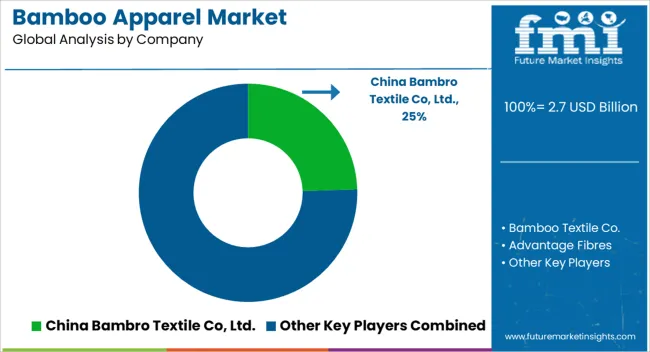
Some key players in the market are China Bambro Textile Co, Ltd., Bamboo Textile Co., Advantage Fibres, Wild Fibres, TIC Gums, China Thrive Industrial Co., Towel Industrial Co. Ltd., Xiamen Ebie Import & Export Co. Ltd., Boody Bamboo Clothing, Cozy Earth, Cariloha, Inc., BLUE BUNGALOW, Free Fly Apparel, Ettitude Holdings, Inc., and Thought Clothing among others.
Bamboo Clothing: Medialab announces their media partner support to Bamboo Clothing for brand growth strategy and focuses on increasing brand awareness in the United Kingdom market.
The recently established Leandrop company sells environmentally friendly apparel made of hemp and bamboo.
| Attribute | Details |
|---|---|
| Estimated Market Size (2025) | USD 2.7 billion |
| Projected Market Value (2035) | USD 4.8 billion |
| CAGR Growth Rate (2025 to 2035) | 6.0% |
| Historical Data Available for | 2020 to 2024 |
| Forecast Period | 2025 to 2035 |
| Quantitative units | Revenue in USD Million, volume in Units, and CAGR from 2025 to 2035 |
| Report Coverage | Revenue forecast, volume forecast, company ranking, competitive landscape, growth factors, and trends, pricing analysis |
| Segments Covered | Type, Fabric Type, Consumer Orientation, Distribution Channel, Region |
| Country scope | USA, Canada, Mexico, Germany, United Kingdom, France, Italy, Spain, Russia, India, Thailand, China, India, Japan, Australia, Brazil, Argentina, Colombia, Saudi Arabia, United Arab Emirates(UAE), South Africa |
| Key Companies Profiled | China Bambro Textile Co, Ltd.; Bamboo Textile Co.; Advantage Fibres; Wild Fibres; TIC Gums; China Thrive Industrial Co.;Towel Industrial Co. Ltd.; Xiamen Ebie import & Export Co. Ltd.; Boody Bamboo Clothing; Cozy Earth; Cariloha, Inc.; BLUE BUNGALOW; Free Fly Apparel; Ettitude Holdings, Inc.; Thought Clothing; Others |
The global bamboo apparel market is estimated to be valued at USD 2.7 billion in 2025.
The market size for the bamboo apparel market is projected to reach USD 4.8 billion by 2035.
The bamboo apparel market is expected to grow at a 6.0% CAGR between 2025 and 2035.
The key product types in bamboo apparel market are t-shirts, innerwear’s, bathrobes, towels, socks and others.
In terms of fabric type, pure segment to command 53.2% share in the bamboo apparel market in 2025.






Our Research Products

The "Full Research Suite" delivers actionable market intel, deep dives on markets or technologies, so clients act faster, cut risk, and unlock growth.

The Leaderboard benchmarks and ranks top vendors, classifying them as Established Leaders, Leading Challengers, or Disruptors & Challengers.

Locates where complements amplify value and substitutes erode it, forecasting net impact by horizon

We deliver granular, decision-grade intel: market sizing, 5-year forecasts, pricing, adoption, usage, revenue, and operational KPIs—plus competitor tracking, regulation, and value chains—across 60 countries broadly.

Spot the shifts before they hit your P&L. We track inflection points, adoption curves, pricing moves, and ecosystem plays to show where demand is heading, why it is changing, and what to do next across high-growth markets and disruptive tech

Real-time reads of user behavior. We track shifting priorities, perceptions of today’s and next-gen services, and provider experience, then pace how fast tech moves from trial to adoption, blending buyer, consumer, and channel inputs with social signals (#WhySwitch, #UX).

Partner with our analyst team to build a custom report designed around your business priorities. From analysing market trends to assessing competitors or crafting bespoke datasets, we tailor insights to your needs.
Supplier Intelligence
Discovery & Profiling
Capacity & Footprint
Performance & Risk
Compliance & Governance
Commercial Readiness
Who Supplies Whom
Scorecards & Shortlists
Playbooks & Docs
Category Intelligence
Definition & Scope
Demand & Use Cases
Cost Drivers
Market Structure
Supply Chain Map
Trade & Policy
Operating Norms
Deliverables
Buyer Intelligence
Account Basics
Spend & Scope
Procurement Model
Vendor Requirements
Terms & Policies
Entry Strategy
Pain Points & Triggers
Outputs
Pricing Analysis
Benchmarks
Trends
Should-Cost
Indexation
Landed Cost
Commercial Terms
Deliverables
Brand Analysis
Positioning & Value Prop
Share & Presence
Customer Evidence
Go-to-Market
Digital & Reputation
Compliance & Trust
KPIs & Gaps
Outputs
Full Research Suite comprises of:
Market outlook & trends analysis
Interviews & case studies
Strategic recommendations
Vendor profiles & capabilities analysis
5-year forecasts
8 regions and 60+ country-level data splits
Market segment data splits
12 months of continuous data updates
DELIVERED AS:
PDF EXCEL ONLINE
Bamboo Straw Market Size and Share Forecast Outlook 2025 to 2035
Bamboo Market Analysis - Size, Share, and Forecast Outlook 2025 to 2035
Bamboo Extracts for Anti-Aging Market Analysis - Size and Share Forecast Outlook 2025 to 2035
Apparel Market Size and Share Forecast Outlook 2025 to 2035
Bamboo Extracts for Skin Market Analysis - Size and Share Forecast Outlook 2025 to 2035
Bamboo Fiber Tableware and Kitchenware Market Size and Share Forecast Outlook 2025 to 2035
Bamboo Engineered Wood Market Size and Share Forecast Outlook 2025 to 2035
Bamboo Market Analysis - Demand, Trends & Industry Forecast 2024 to 2034
Apparel Re-commerce Market Size and Share Forecast Outlook 2025 to 2035
Bamboo Packaging Market Share, Growth & Trends 2025 to 2035
Bamboo Cups Market Analysis and Insights for 2025 to 2035
Bamboo Products Market Analysis – Trends & Growth 2025 to 2035
Market Share Insights for Bamboo Straw Providers
Gym Apparel Market Size and Share Forecast Outlook 2025 to 2035
Pet Apparel Market Analysis - Size, Demand & Forecast 2025 to 2035
Chef Apparel Market Size and Share Forecast Outlook 2025 to 2035
Kids Apparel Market Trends - Growth, Demand & Forecast 2025 to 2035
Rugby Apparel Market Forecast and Outlook 2025 to 2035
Blank Apparel Market – Growth & Demand Forecast 2025 to 2035
Outdoor Apparel and Accessories Market Size and Share Forecast Outlook 2025 to 2035

Thank you!
You will receive an email from our Business Development Manager. Please be sure to check your SPAM/JUNK folder too.
Chat With
MaRIA